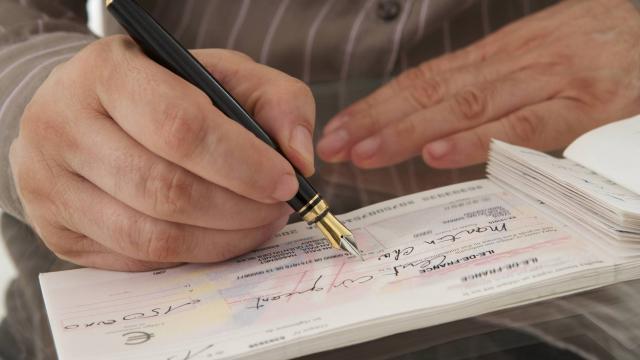In France, the Cheque has its Followers and is Resisting Change

Expensive for banks, obsolete, not reliable enough: the cheque is doomed to disappear for years, largely due to strong government pressure. But its fans, like business, are resisting change …
Latest attack: the government’s desire to reduce the period of validity of one year to six months, in a country that remains attached to it, for a means of payment.
Fourth means of payment in Europe, the cheque is a French exception. In 2013, almost 71% of checks issued in the European Union were in France.
steady decline
A French on average uses about 37 checks a year, against 11 for English and less than one (0.38) for a German, stated the Ministry of Finance in a report in 2015.
However, its use decreases steadily, averaging 4 to 5% per year. According to data from the Bank of France in 1975, the check was 75% against 12% of payments in 2014.
Since 2010, the government has stepped up initiatives to develop a strategy for officially “support the development of new means of payment” and, according to a banking group wishing to remain anonymous, “get with the cheque that costs too dear to everyone ” .
And the steps involved in that have flourished in the last three years: liability of notaries by transfer beyond 3000 euros, capping the cheque payment of public debt limited to 300 euros, gradual spread of dematerialized payments to the public sector.
However, the frontal attacks against the cheque do not seem to recipe. In late September, MEPs restored, against the advice of the Government, the period of validity of the cheque to 12 months, while the projet of the loi Sapin bill planned to reduce the time to six months from July 2017.
Win time
Because this micro-credentials, adopted in France in the nineteenth century, several opposed camps. “It’s a dinosaur of the bank! ” Exclaims one industry analyst, reporting that ” the bankers are wondering how to get rid of it” given its cost in terms of treatment.
According to a report commissioned by Bercy and published in 2012, the provision and free use of cheques were costing the French banks 2.5 billion euros, while credit cards represented an income at least equivalent (2.6 billion ).
Even if “individuals have fewer blockages towards new means of payment, the cheque is still used by professionals, SME and independent” , told AFP Reine-Claude Mader, president of the association CLCV consumers.
“If we offered alternatives at reasonable cost, they would be adopted but we are not ready to abandon the use of cheques in inter-company relations because we touch a crucial point which is the cash” , for defending Guilhem Darre his part, general delegate of the Union of independent.
“The cheque saves some time” , he added, recalling that 30% of TPE have cash flow problems.
“We need an incentive”
For artisanal professional Union (APU), “the banking sector has not communicated in the direction of dematerialization, or able to set up other easy and inexpensive devices”, laments its secretary general Pierre Burban.
Both unions point to the high cost of rental and updating of mobile payment terminals.
“We need an incentive” payment dematerialized, argues Mr. Burban, which also finds a broadband coverage problem on the whole territory.
Enjoyed this? Get the week’s top France stories
One email every Sunday. Unsubscribe anytime.


